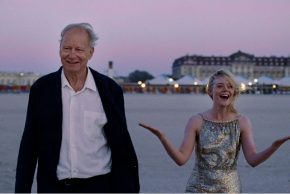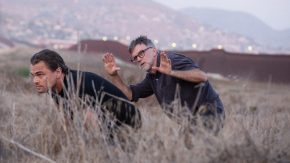“I wish the audience to experience the same miracle I experienced”
Frédéric Chopin once told their friends that even if he dies, he will still hear from the afterworld if they play something to commemorate him. A friend enthusiastically offered to play his cello-piano sonatas, but then Chopin said: “No, do not play MY music! Play something gorgeous! Like Mozart.” This is what happens at the Bartók Spring International Art Weeks: they are going to play Mozart – three especially beautiful pieces by him. We can get to know a unique instrument, the fortepiano, and award-winning pianist Mihály Berecz who plays it. This will be a time travel to the age of Wolfgang Amadeus Mozart! We were talking to Mihály Berecz about the concert on 18 May, which starts at 7:30 and is completely free.
What makes fortepiano so special?
Fortepiano is a predecessor of modern-day piano, but different in many ways. The type that I play is the copia of a Viennese instrument made in the 1780s. It is smaller than a contemporary piano and everything on it is wooden. Its strings do not cross each other, which makes its sound very special. Its pedals need to be pushed with knee instead of foot, but the audience does not notice this. It is much quieter, but its bass is much more characteristic. Modern pianos have long sounds, fortepianos shorter ones, that is also a huge difference.
How does it work to switch to such an instrument?
There are much less opportunities to play this type of instrument. One has to get used to how small it is, how delicate it is – that is a big challenge! Instead of a modern piano, I cannot play a fortepiano ‘from the upper body’. I play from my fingers and from nearby. Otherwise, from the perspective of the pieces, it is much easier to play them on the instrument they were originally written for.
With the growing popularity of early music, fortepiano gets more and more popular, too. Is it because of the historically accurate sound?
Yes, because it is much more authentic. This is how Mozart imagined these pieces. It is also hard, of course, because the original instruments are very difficult to reconstruct, so we usually play copias. Also, a huge concert hall is a challenge for a Mozart piano concerto with a historically accurate instrument. It actually makes me feel lucky that this will be an online stream, as I am not sure how this little instrument would sound in that huge concert hall of the Müpa. Microphones made me more relaxed and gave me more opportunities with the instrument.
How do you relate to Mozart’s works? Do you remember the first time you encountered him?
I fell in love with Mozart’s music when I listened to Annie Fischer’s interpretation. Then came The Magic Flute and many others. But I needed to wait until my piano teacher allowed me to play Mozart. It was a huge joy to learn my first Mozart piece, the Piano Concerto No. 453. Since then, he has been one of the most important composers in my repertoire; I play eleven of his works very often. I love to play Mozart, especially when I cooperate with György Vashegyi, as we usually do this together. Orchestra and conductor have a role as important as the pianist. One should work with the right people, it is important to speak the same musical language and to be an experienced team.
Have you worked with the Orfeo Orchestra and Purcell Choir for long?
My first concert with the Orfeo Orchestra was on the day of my high school final examination in German. We played Mozart’s and Beethoven’s piano concertos on that day. This was six years ago, and since then we had many performances together. We are like friends, and I love to work with them, especially with concertmaster László Paulik who used to be my teacher in chamber music.
How can Mozart’s music stay so fresh?
There are many reasons for that. One is his professional knowledge. Composers of his time were all well-prepared, but he had a unique taste. The way he chose what to use from the tools and how was a sign of rare talent. Another reason is the way how emotions were expressed by his music, especially in his piano concertos: they also show how he was able to play, in such a virtuose way which is also one in a million. The piano concertos have a special place in his life work. Most of his works have happy vibes, but I cannot name any of them without also having some dark clouds within them. The Piano Concerto in E Flat Major, which will be at the concert, is extraordinarily gloomy, connecting to the Kyrie part of the Great Mass in c minor to be heard after the break.
Why should the audience listen to this concert?
The Great Mass in c minor is Mozart’s most significant sacral piece apart from the Requiem. Some of its opuses, like the Laudamus Te, could be part of one of his Italian operas. I had the fortune to listen to this piece live by the Purcell Choir and Orfeo Orchestra, conducted by György Vashegyi, and it was marvellous. I wish the audience to experience the same miracle that I experienced back then.
Are you prepared for returning to live concerts?
In June, I plan to play live already. There will be a collection of Bartók’s pieces in the Bartók Memorial House with Éva Osztrosits. In summer there will be a lot of concerts: among others, I am going to play at the KaposFest, and in front of the Vajdahunyad Castle with the St Stephen Symphonic Orchestra as an open-air gig. I am looking forward to welcoming people again, not only in front of screens anymore.
Interview: Anna Rácz
Translation: Zsófia Hacsek

























Comments
1 Responses to “Mozart’s music on a historically accurate instrument! – interview with pianist Mihály Berecz”